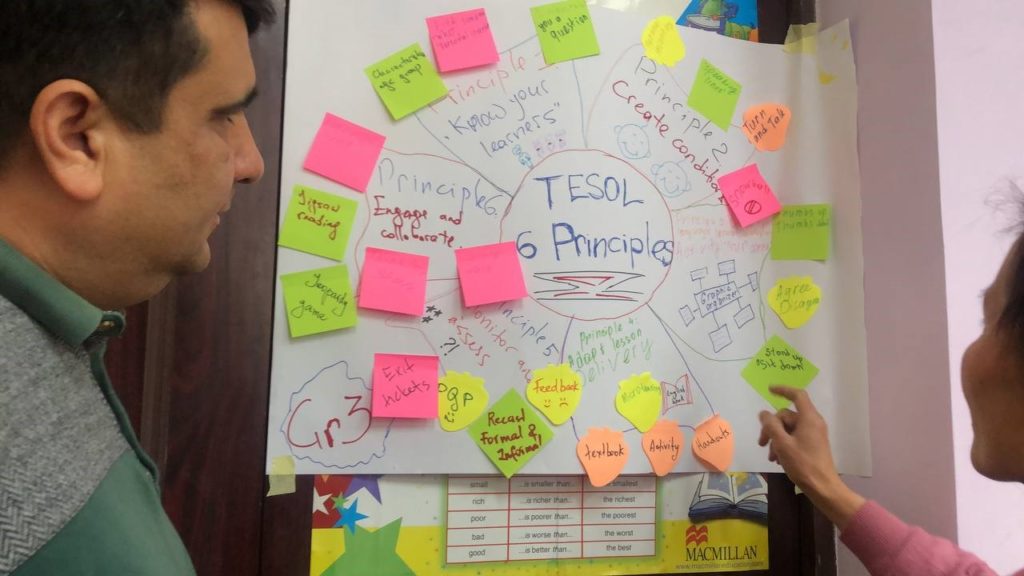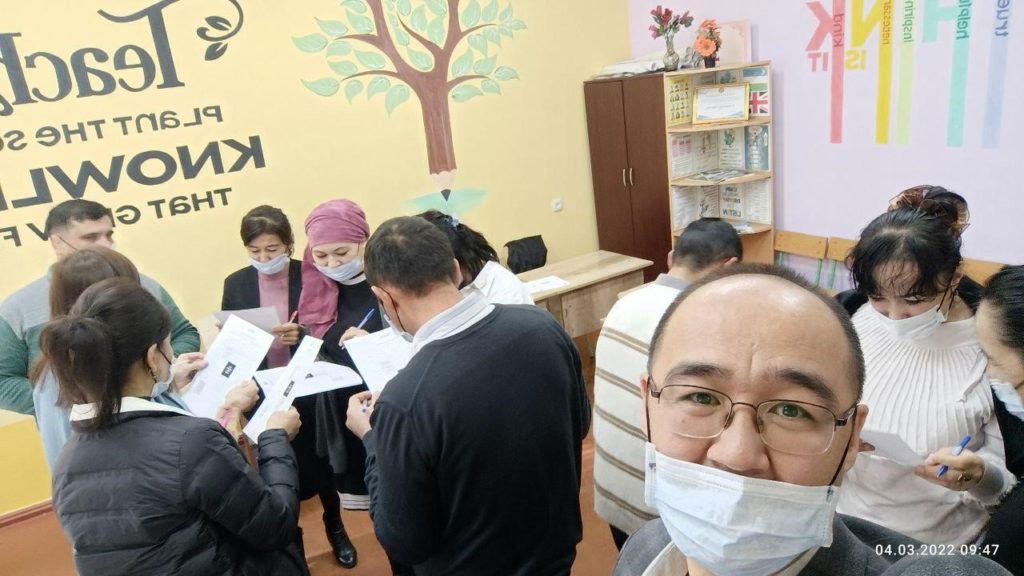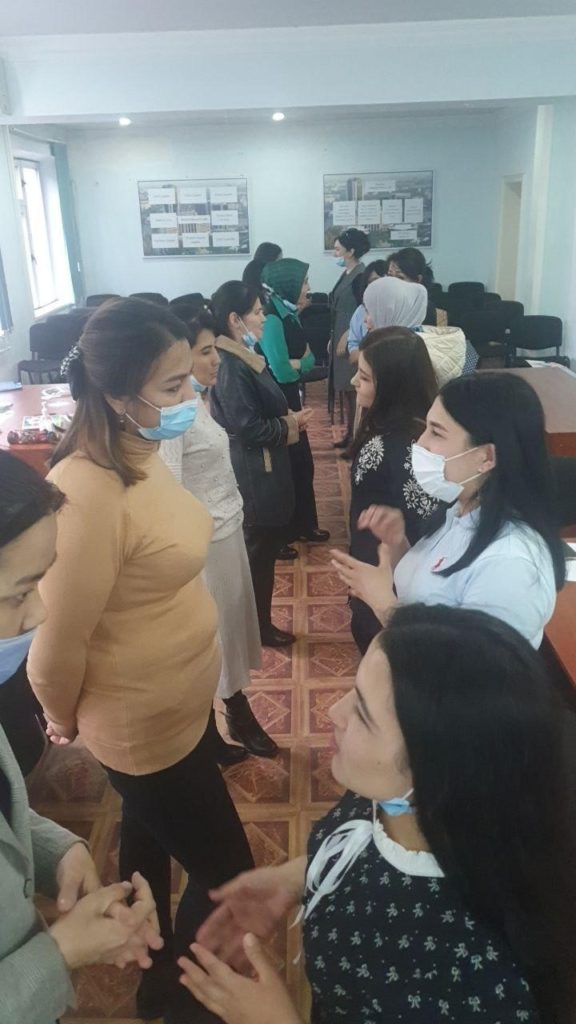Scaffolding PD in Uzbekistan: Cascading Student-Centered Methodologies
This post is part of a series on Scaffolding PD in Uzbekistan as part of the English Speaking Nation Secondary Teacher Training (ESN) Program; you can read an overview of the program here.
Starting 4 March 2022, 82 core trainers began cascading the information they learned from TESOL’s 6 Principles and George Mason University’s Teaching English Through English course to 837 regional peer mentors throughout all 14 regions of Uzbekistan.
Preparing for Cascading: Preparing Teachers Online and in Person
Before our ESN participants took any professional development (PD) courses, ESN coaches observed English teachers across Uzbekistan. They noticed that many teachers spoke the majority of the class time and used direct translation methods. These PD courses have introduced an alternative approach to language learning and teaching English in Uzbekistan.
Each core trainer started the process with different levels of teaching and teacher training experience. Teachers in each region convened and discussed the guiding principles that needed to be included in their cascading courses. Each site was given the autonomy to plan how they would collaborate and give their training.
Adjusting the Plan as Needed: Turning Challenges Into Opportunities
Stepping Up as Needed
Many teachers work not only at public schools but also at language centers, study or teach at universities, as well as have responsibilities at home. Teachers also had many other events they needed to attend like competitions and national exams, which affected weekly attendance. In such situations, core trainers, coaches, and regional peer mentors had to support each other and fill in as needed.

Making Activities Your Own
Teachers were open to using all of the new activities from the training with their own students, but knowing how to adapt an activity for their students’ needs was not as easy as it seems. Coaches and core trainers added a lot of extra support during observations and cascading sessions.
Holding Each Other Accountable
Keeping teachers accountable and responsible for practicing what they learned during cascading sessions was initially difficult. Core trainers and coaches implemented various ways of holding teachers accountable. For example, some sites used Telegram groups to share their classroom experiences while other sites used reflection journals. Coaches gave feedback to trainers the Friday of cascading trainings as well as to the teachers who would practice using the techniques they learned with their students during the rest of week.
Empowering Local Teachers
There was an expectation and bias among some; they valued native English speakers more, believing them to be more qualified to be teacher trainers. This was something core trainers had to overcome initially when facing a group of possibly skeptical regional peer mentors. However, once teachers experienced the training and saw the impact of new activities in their classrooms, teachers felt inspired and empowered, seeing exceptional professionals from their own communities.

“I think meeting with other English teachers every week creates an English atmosphere and improves teachers’ speaking skills as well.”
–Gulchexra Jo’rayeva, School 6, Syrdarya District
Bringing Best Practices to the Classroom
In the end, what truly matters is what happens in the teachers’ classrooms. Some key improvements and uses of best practices that were observed during lesson observations were the following:
Warm Ups and Review Time
For warm-up and review activities to be most effective, they must be related to the lesson objectives while also being interactive.
“We learned new warm-ups and techniques for teaching, which all lead to a new way for teachers to interact with their students.”
–Ayjamal Idireysova, Specialized School # 317, Sergeli District

Pair Work and Group Work
A challenge some teachers initially faced was extended periods of seated time where students minimally speak with their classmates in English. After the cascading sessions, teachers started incorporating more pair work and group work into their daily routines.
“Many of the activities in the course are designed to be done by teachers working together in pairs or small groups. This allows more teachers to be involved in the activity and gives a chance for teachers to help each other and develop ideas together.”
–Mavjuda Kalandarova, Specialized School 1, Gulliston City
Formative Assessments
After the cascaded training, teachers learned how to use assessments as a tool to adjust their own lessons and provide extra support as needed.
“I have learned to give short and clear instructions, give positive feedback and use rubrics for assessments.”
–Umida Khudayberdieva, Specialized School # 1, Navai City
Teacher-Talk Time Awareness
Teachers started to become more aware of how much they were talking.
“Before cascading, I thought that the teacher should talk with students as much as possible. Nowadays, I give my students the opportunity to express their own ideas and motivate them to speak and socialize with each other.”
–Elena Azimjonova, Specialized School #4, Bukhara Region
Next Steps of Cascading
All regional peer mentors will be responsible for recruiting 18 teachers each from their community and training them from October to December. Core trainers will be responsible for teaching model lessons and for helping prepare their regional peer mentors to train colleagues, the same way coaches prepared core trainers in the first phase and second phases of cascading.
Regional Conference
Teachers will have the opportunity to share highlights from the program at the TESOL Regional Conference in Tashkent in June 2022. Read more about how we scaffolded the proposal and presentation process in our next blog in May.

